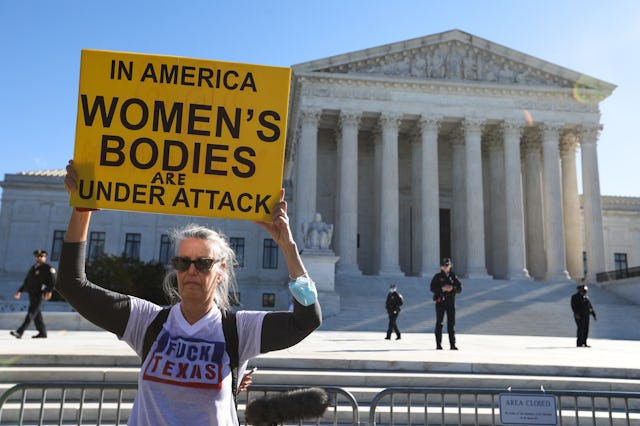Supreme Court Will Overturn Roe V. Wade, Leaked Papers Show
A leaked draft opinion written by Justice Alito ends the right to abortion at a national level.

Since 1973, Americans have had the constitutional right to abortion under the Supreme Court’s decision in Roe v. Wade. On Monday evening, a leaked draft decision penned by Justice Alito was released by Politico showing that the court has decided to reverse Roe, leaving the question of abortion rights to the states — effectively sounding the death knell for the legal right to abortion in much of the American South and Midwest.
The leaking of a draft decision like this is completely unprecedented, and indicative of the enormous impact of this decision.
The Court’s ruling upholds a Mississippi law that bans most abortion after 15 weeks of pregnancy (there are medical exceptions). That law was blocked by the New Orleans-based 5th Circuit Court of Appeals because it undermined the precedent set by Roe, which protects a person’s right to abortion up to the point of viability, generally considered to be around 22-24 weeks of pregnancy.
In the draft opinion, Justice Alito’s language is unsparing. “Roe was egregiously wrong from the start,” he writes. “Its reasoning was exceptionally weak, and the decision has had damaging consequences.”
“It is time to heed the Constitution and return the issue of abortion to the people’s representatives,” Justice Alito writes, seeming not to understand that the Constitution is an ever-evolving document written by white men before abortion was a safe and widespread procedure.
While it is possible that the decision will undergo changes before the court releases a final draft, expected in June, meaningful revisions are unlikely.
This is it. The year of 2022 will be the year that we lose our right to choose at the national level.
Conservative lawmakers have long prepared for this day, which pro-choice advocates have feared since Trump’s election in November 2016. According to the Guttmacher Institute, which tracks policies concerning reproductive health, 23 states have laws that will restrict abortion as soon as the court’s ruling is officially handed down. Some states are covered by multiple laws.
A full 13 states currently have ‘trigger laws’ set to criminalize abortion as soon as Roe is overturned. And another 9 states still have their pre-Roe abortion bans, unenforced since 1973, on the books. Nine states have laws currently blocked by courts that could go into effect once Roe is overturned. Seven states have laws designed to restrict abortion rights to the maximum extent allowed by the Supreme Court, and 4 states have gone so far as to amend their constitutions to declare that the right to abortion is not protected in their states.
Only 16 states and the District of Columbia have laws that protect the right to abortion even in the absence of Roe.
The post-Roe landscape is set to look a lot like it did pre-Roe: people in more liberal states, mainly along the coasts and to the north, will have access to abortion, while people in states located in the South and Midwest will lose what access they had remaining after decades of conservative efforts to restrict abortion rights.
Currently, six states have only one remaining abortion clinic. This includes Jackson Women’s Health Organization, the lone clinic in Mississippi the respondent in the case brought before the Supreme Court.
Yet the way that abortion care is delivered has changed dramatically since 1973. Medication abortion now accounts for more than half of abortions performed in the United States, according to the Guttmacher Institute. Telehealth services now allow people to discreetly receive abortion pills by mail, making it difficult to know who is providing access to the medication — but, conservatives are already at work on legislation to restrict access to medication abortion.
As the country has also seen in the past, abortions will still be available for the privileged, rich, and connected, who can travel, receive pills by mail, or safely find medical professionals who can help, while those without such privileges — people in rural communities, people living in poverty, and People of Color — will not have such choices.
The only hope of undoing this bleak, Handmaid’s future is legislative.
Remember checks and balances? A Supreme Court ruling such as this one can be circumvented by legislation, which is exactly what Democratic lawmakers are calling for. President Biden released a statement, saying, “If the court does overturn Roe, it will fall on our nation’s elected officials at all levels of government to protect a woman’s right to choose. And it will fall on voters to elect pro-choice officials this November.”
If you’re outraged — and you should be — make sure you’re registered to vote. And make your voice heard.